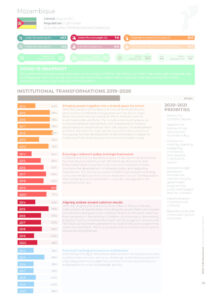Nutrition situation
Under five stunting (%)
42.3
Under five overweight (%)
7
Anaemia in women 15-49 years (%)
51
Under five wasting (%)
4.4
Low birth weight (%)
13.8
0 to 5-month-old exclusive breastfeeding (%)
41
Adolescent overweight (%)
Male: 7.3
/ Female: 16.3
Adult overweight (%)
Male: 18
/ Female: 33.6
Adult obesity (%)
Male: 3.3
/ Female: 10.5
Adult diabetes (%)
Male: 6.6
/ Female: 6.2
COVID-19 snapshot
The government took several actions early on to contain COVID-19. The Ministry of Health has developed a Preparedness and Response Plan. Monitoring and data collection efforts could build on existing initiatives, such as the mobile Vulnerability Analysis and Mapping (mVAM) platform.
Institutional transformations 2019-2020
Bringing people together into a shared space for action
With the creation of the National Council for Food Security and Nutrition (CONSAN), the government has shown highlevel commitments, including the Prime Minister and the multistakeholder platform. The coordination mechanisms are institutionalised at central level with preparation in hand to decentralise to the provinces. With the support of development partners, the creation of provincial councils in three provinces is ongoing. Further development of partnerships is in place for financing of the food security and nutrition baseline study.Ensuring a coherent policy and legal framework
CONSAN and the Consultative Council of the Technical Secretariat for Food Security and Nutrition (SETSAN) are the forums that bring stakeholders together to discuss and coordinate actions to ensure the development of coherent policy and legislative frameworks. The Decree to create CONSAN was revised according to recommendations from the last National Council. The Regulation that creates provincial and district councils, was aligned to the decentralisation law.Aligning actions around common results
With the ongoing Multisectoral Action Plan to Reduce Chronic Malnutrition, all stakeholders, including the government, are focused on indicators and goals to be achieved. Based on this plan, there has been progress in: deworming of children and teenagers; deworming pregnant woman; antiretroviral treatment for pregnant women with HIV-AIDS; school feeding programme; food fortification programme; water and sanitation. Sharing good practice and information reports should be strengthened.Financial tracking and resource mobilisation
Monitoring of budget allocations and execution for food security and nutrition interventions remains a challenge. Establishing a system for improving planning, budget formulation, monitoring and resource mobilisation is a multi-stakeholder priority.2020-2021 Priorities
- Review the CONSAN Decree
- Approve the National Food Security and Nutrition Policy.
- Finalise the tracking, planning, budgeting, monitoring and resource mobilisation system.
- Increase budget allocations for food and nutrition security government programmes, count with budget lines for nutrition.
- Decentralisation of SETSAN and CONSAN.
- Base line study and information system improved.
Download

